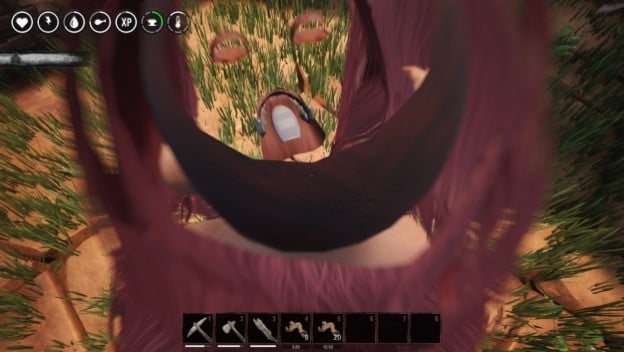When it comes to covering games, Early Access titles are the bane of my existence. They’re a walking contradiction, in that they are a product that one (usually) must pay for, and yet they’re in a constant state of flux. Games like Kerbal Space Program and Prison Architect originally released as mere shells of their present states, while other games have barely changed over the course of their Early Access period. Still others have come out in Early Access purely to escape criticism, as the prevailing notion is that it’s impossible to pass judgement on a game until it’s finished.
The hardest part about all this for me is that I find that belief to be wholly inaccurate… and completely correct. I’ve looked at games like ARK: Survival Evolved and Conan Exiles while they’ve been in Early Access and found them to lack in features, be bursting at the seams with bugs, and perform as though I were trying to run Skyrim on an Apple II. That is to say, they’ve been worth nowhere near their $40+ asking prices. By that logic, I feel that it’s my job as a critic to inform potential buyers of these inadequacies, in the hope that I can “rescue” someone from burning their hard-earned cash on an inferior product.
However, the whole point of Early Access titles is that they’re constantly evolving. When I first covered a game called Hell Warders , I found it to be a buggy, nigh-unplayable mess of a game, and subsequently penned an incendiary article to reflect those beliefs. A week later, so much of the game had been fixed that I ended up revising my piece into one with a far more positive spin. The thing is, at both points in time, the game was available on Steam to anyone willing to fork over the cash. If I had released the original article and bashed Hell Warders to hell and back, people would have looked at it a week later and wondered if they played the same game as me. Similarly, people who played the game near launch and proceeded to abandon it may be wondering if I was paid off by the developers, due to my more positive outlook.
That’s to say nothing of games that “worsen” during their Early Access stint. A notable instance of this is Darkest Dungeon’s “corpse” mechanic. I remember the day I checked the Steam store page, only to find the game’s user review score plummeting far below the “Mixed” range; it was a shock, considering I had heard nothing but good things about the game up until that point. That’s just it, though: the game was positively received at first. That reception caused lots of people to pick it up, but also generated a mountain of negativity once development veered into a direction that dissatisfied fans.

One has to ask if any of that controversy would have happened if Darkest Dungeon simply released as a full product – corpse mechanic and all. Would people have panned the game due to this frustrating inclusion? Or would they have embraced it as “just one of the quirks”? Either way, I think that Early Access tends to set expectations about what a game will be, which almost always results in backlash if those expectations get subverted.
It’s for these reasons that I’m tired of covering Early Access titles. At the end of the day, people tend to fall into one of two camps: those who’ll snatch up a game as soon as it hits Steam, just so they can be the first ones “in”, and those who are willing to sit back and see how things pan out. While I don’t think there’s anything wrong with either side from a consumer point of view (after all, a lot of games release in Early Access to fund the rest of their development), I think that critiquing an Early Access title inherently neuters the points being presented. In the case of the average competent Early Access project, most – if not all – of the criticisms will be completely obsolete within a patch or two, and it’s possible that the same may apply to several compliments. At that point, whether it’s a review, preview, or some other feature, it becomes a relic of the past; one that is just as irrelevant as the first version of the game in question.
